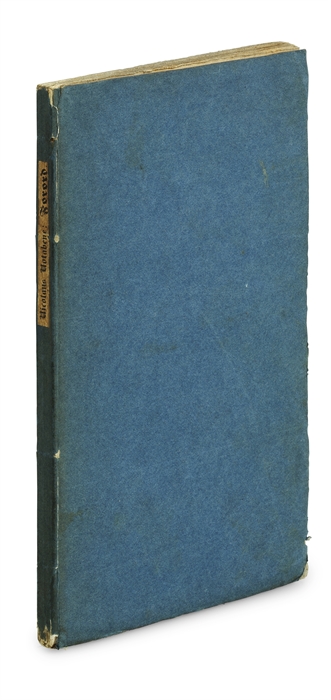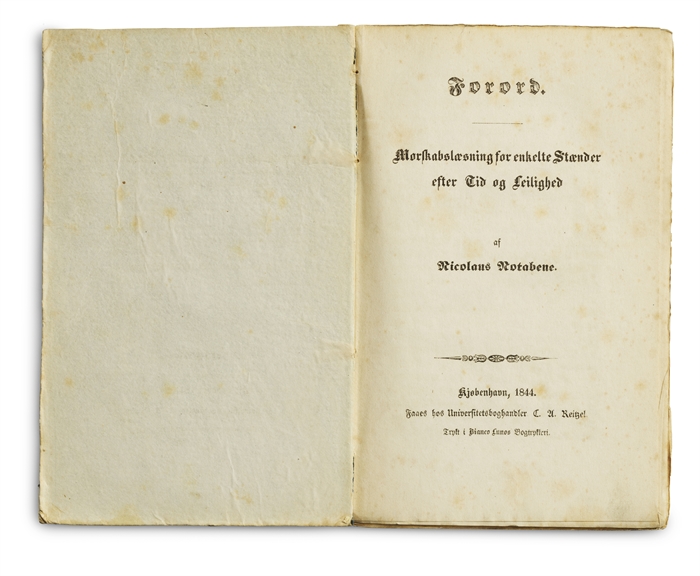KIERKEGAARD'S SARCASTIC ROASTING OF THE HEGELIAN SYSTEM
KIERKEGAARD, SØREN.
Forord. Morskabslæsning for enkelte Stænder efter Tid og Leilighed af Nicolaus Notabene.
Kjøbenhavn, Reitzel, 1844.
Small 8vo. 110, (1) pp. Completely uncut in the original blue cardboard-binding. Minimal wear to capitals, and hinges with a tiny tear to front upper and back hinge. Minute paper loss to capitals, and minimal loss to one corner. The printed title-label preserved in its entirety. Brownspotting due to the quality of the paper.
A truly magnificent copy in completely original state – almost looks like it came straight off the press.
First edition of Kierkegaard's most humorous book, Prefaces, in the very rare original blue binding in truly magnificent state and with the printed title-label preserved in its entirety. Published simultaneously with The Concept of Anxiety, Prefaces can be viewed as its companion piece. It represents an altogether different genre and is the most humorous of all of Kierkegaard’s works, but the two fictional authors of the works interestingly contrast each other. Although having been eclipsed by the now notoriously famous Concept of Anxiety, Prefaces was in fact more popular when it appeared and sold many more copies. Written under the pseudonym of Nicolaus Notabene, the “author” name indicates that despite its humorous approach, Prefaces is still something serious – something to be noted. And it certainly is. It is here that we find Kierkegaard’s sarcastic roasting of the Hegelian system and of the Danish Hegelians with Johan Ludvig Heiberg as the main representant. Through Notabene, he makes fun of Heiberg and Hegel, who both want to explain everything and want to be mediators of understanding. Just as Hafniensis in The Concept on Anxiety poses that “how sin came into the world each man understands solely by himself. If he would learn it from another, he would misunderstand it” (p. 51), so Notabene in Prefaces states that “My frame, my health, my entire constitution do not lend themselves to mediation” (p. 45). In Prefaces we also find Kierkegaard’s thoughts about the relationship between the reading public and the author and his fierce criticism of literary critics and reviewers, among these also Heiberg as well as Martensen, who famously reviewed Either-Or and Repetition respectively. And in the very amusing preface to the Prefaces, we are given another glimpse into Kierkegaard’s thoughts on marriage and the dilemma he found himself in with Regine – the inner struggle between he, who is the husband, and he, who is the author; can one be both? With its challenging notions on the idea of the book and the interaction of the book with its readers, his little ironic masterpiece is a clear forerunner of Postmodernism. “Kierkegaard’s ‘Prefaces’ is a brief though not unimportant work. Themes he develops elsewhere at greater length here are presented with characteristic insight and wit. This richly suggestive text has never received the attention it deserves. William McDonald’s fine translation now makes it possible to assess the importance of ‘Prefaces’ for Kierkegaard’s œuvre and to appreciate its significance for philosophical, literary, and theological issues that are still with us.” (From the review of William McDonald’s 1989 edition of Prefaces in English in the Kierkegaard and Postmodernism-series). Written under a pseudonym and without Kierkegaard’s name appearing as publisher or indeed as anything else, he was unable to give away presentation-copies of the work (due to his own strict set of rules for this). Thus, not a single presentation copy of the work exists. A single copy of the book was in the auction catalogue of his book collection after his death. Himmelstrup 70. The present copy is no. 28 in Girsel's "Kierkegaard" (The Catalogue) which can be found here.
Order-nr.: 62263


